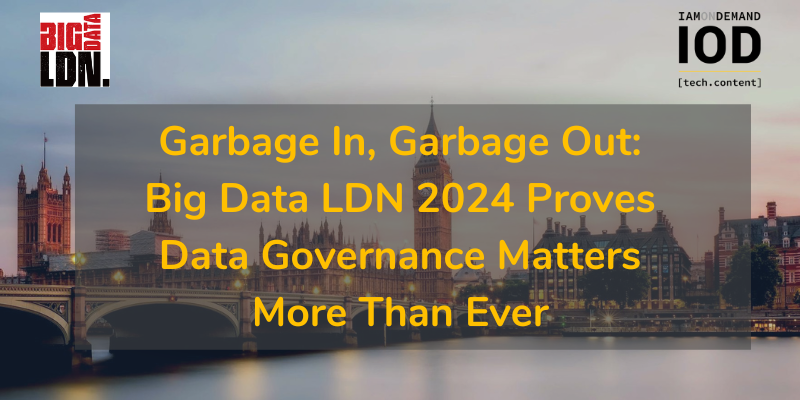Big Data LDN 2024 was a whirlwind of AI buzzwords and data-driven dreams. While the event didn’t deliver on every promise, it sent me home with enough valuable insights into the future of data analytics to leave me optimistic.
I was surprised by the crowd this event is bringing in now.
Big Data London was launched in 2016 as the UK’s premier data and analytics event. From a few thousand in its early years, this year, it pulled in about 16,500 attendees to the Olympia in London over two days from September 18 to 19. It brought in over 300 industry expert speakers and prominent exhibitors from the world of data like Power BI Sentinel, Metric Insights, ThoughtSpot, OpenWeather, Skyscanner, and Cloudera.
The numbers alone prove that the industry is growing and evolving, even if the content of the talks reveals that the pace of change is slower than some in the trenches might like.
As a conference, Big Data LDN packs so much into two content-filled days. Cutting-edge AI demos to practical data management strategies; keynotes and demos and panels and much, much more.
Lurking beneath it all, though, was a mundane reality: You can’t achieve the glitzy, shiny promise of AI without first taking care of the fundamentals of data quality and governance. Innovation, it turns out, can’t happen without a little practical housekeeping first.
But it turns out that’s easier said than done.

It All Starts and Ends with Data
The single mantra that kept coming back to me throughout Big Data London was an ancient one in computing terms: “garbage in, garbage out.”
AI is only as smart as the data it’s fed. Dump junk into your models, and you can’t expect a masterpiece to come out the other end.
It seems like many organizations are still struggling with this idea and everything that goes with it: siloed data, inconsistent formats, and inaccuracies. You can’t build a house on a shaky foundation. No matter how much paint you slap on it, it’s not going to hold up.
Expectations for AI, especially GenAI, with the rise in new offerings like Microsoft Azure Open AI, are sky-high. Organizations hope that at the press of a button, they’re going to get the world’s best chatbot—hopes fueled by business-focused services like Amazon Q. You don’t want users to have to wait for the bot to answer; what you really want is for it to read their minds. We’re close to being able to achieve that, but it all starts and ends with data.
AI-driven decisions are only as reliable as the data they’re based on. That means incorrect data leads to costly mistakes and missed opportunities. Worse still, unreliable AI solutions can damage your organization’s reputation and erode customer trust. A slow chatbot is one thing—a chatbot that lies is going to destroy your business.
The Not-So-Secret Secret to Successful AI Transformation
To effectively manage data for AI, you need to ingest from a range of diverse sources, clean it up, format it uniformly for analysis, and enrich it with additional context and insight. At the same time, you need to make sure it’s accessible—and that your data is moving at lightning speed.
Almost everybody understands that model accuracy is crucial. But since AI models learn from data, that means that if your data is inaccurate, biased, or incomplete, the results will inevitably be flawed.
Today’s rush to adopt AI often means that organizations try to skip—or skimp on—data preparation. And until businesses prioritize data quality, they’ll struggle with unreliable AI models as Starburst Data VP, Field Chief Data Officer Adrian Estala noted in his talk about transforming raw data into solid assets on which to build AI. Paola Oliveri from Google Cloud also touched on this in her talk about database and analytics modernization.
Other challenges holding organizations back when it comes to AI?
Speakers like Oliveri and Barry Lloyd of Impetus Technologies explained that many are weighed down by legacy systems and underdeveloped data strategies. There’s also often a disconnect between leadership’s strategic vision for AI and the day-to-day realities of data management, leading to challenges of accessibility, integration, and governance.
It may be, as IOD CEO Ofir Nachmani has mentioned before, that commitment to the intensive demands of AI infrastructure isn’t adequately growing and keeping pace.
One encouraging change is that lots of companies are talking about treating data as a core asset, even if few of them actually seem prepared right now to manage that asset well.
To me, it sounded like most companies were overestimating their readiness while underinvesting in fundamentals like data infrastructure. It’s an easy problem to fix but it may take a paradigm shift: “Everyone needs a data mindset,” as Helen Mannion of Prospore put it.

What’s Up for 2025 and Beyond?
But hey, it wasn’t all bad news. In fact, it was mostly good news, and I definitely left Big Data LDN feeling encouraged.
It’s clear why organizers call this “the premier data industry event,” or that it attracts some of the most serious data analytics engineers, solutions architects, CTOs, and CDOs out there, not to mention heavy-hitting exhibitors. So it’s natural to come away energized about the AI future.
People I talked to—yes, I managed to find solid networking opportunities packed into these busy two days, connecting with IOD clients and explaining our enterprise tech marketing services to DevRel and other AI-industry marketers—seemed more committed than ever to turning awareness into action.
Discussions ranged from hybrid cloud, modern data architectures, and deploying enterprise AI, as well as how regulations such as DORA, the EU Data & AI acts, and GDPR are impacting the development of AI solutions.
Among the sessions I managed to catch, there was particular emphasis on applications of AI in industries like:
-
- Sports: From Patrick Lucey of SportsPerform
-
- Healthcare: Including a fascinating panel with the Women In Data®, Health initiative
-
- Electric vehicles: From Elysia Battery Intelligence
-
- Corporate travel: From the Take2Eton Group
As someone rooted in the marketing world, I especially appreciated hearing about improvements in AI for marketing analytics from John Readman from ASK BOSCO® and James Smith of ThoughtSpot.
And a talk from Wim Stoop of Cloudera about building a future-proof data, analytics, and AI platform gave me lots to think about when it comes to the role of empathy in getting the most out of AI.
With a focus on data governance, quality, and collaboration, the data community is poised to move from talk to execution. As attendees witnessed, there are plenty of tools out there; it’s now up to organizations to implement manageable, scalable, and sustainable AI strategies for the real world.
And that’s where the future looks brightest: As more companies begin treating data as a genuine asset (not just talking the talk but actually investing in the infrastructure they need to walk the walk), I’m excited to watch things finally starting to shift from knowing the challenges to actually solving them.
Based on the momentum I saw at Big Data LDN 2024, the future of AI is very bright indeed. More and more, we’ve decided we’re done talking about AI and ready to start doing AI—once we take care of that data quality housekeeping first.
Need creative, deep-tech marketing content for your enterprise AI brand? Book your free consult with IOD’s expert team today.

